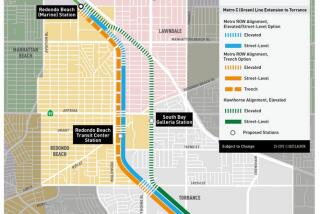California Commute: Metrolink will extend 91 line to south Perris
In its first major expansion since 1994, the Metrolink commuter railroad that serves Southern California is converting 24 miles of an old freight route to passenger service between Riverside and Perris.
The $248-million project will extend Metrolink’s 91 Line to new stations in north Riverside, Moreno Valley, downtown Perris and south Perris.
After years of planning and a lawsuit that temporarily blocked the proposal, construction finally began in October 2013. Passenger service could begin as early as October, two months ahead of schedule, officials said.
“We’ve wanted to see Metrolink out here for a long time,” said Perris Mayor Daryl Busch, vice chairman of the railroad’s board of directors. “We’re looking forward to it. It’s going to be a great asset for the community.”
Metrolink, which now has 512 miles of track and carries an average of about 41,500 riders each weekday, serves Los Angeles, Orange, Riverside, San Bernardino, San Diego and Ventura counties.
The system was last expanded 21 years ago with the addition of the Antelope Valley Line from Lancaster to downtown’s Union Station.
The Perris extension will use a section of Southern Pacific Railroad track, which still serves some freight traffic, that was purchased by the Riverside County Transportation Commission in 1993. Safety at railroad crossings will be enhanced, and noise abatement measures will be installed in some neighborhoods close to the tracks.
The new route is projected to carry about 4,350 riders on weekdays, potentially eliminating thousands of trips on interstates 215 and 15 and state routes 60 and 91.
The project includes a 10-mile stretch of double track, along with new gates, raised center dividers, flashing warning devices and pavement markings at rail crossings. Crosswalks for pedestrians will be installed at two crossings.
Three crossings — Poarch and Gernert roads in Riverside and 6th Street in Perris — will be closed permanently to traffic, except for emergency vehicles. Sound walls will be added in some areas, and “quiet zones” will be established in the city of Riverside. Trains entering such areas are prohibited from sounding horns, except in emergencies or as required by federal regulations.
The cities of Perris and Moreno Valley pushed hard for the added service, said Jeff Lustgarten, a Metrolink spokesman. “Some would like to see service extended all the way to the Coachella Valley, but more analysis and identification of funding would be needed.”
Planning for the expansion began about 11 years ago, officials say. But the recession and a lawsuit filed by the Friends of Riverside’s Hills, an environmental group, delayed the project.
The lawsuit was settled in July 2013 with requirements to increase the soundproofing of homes near UC Riverside, the preservation of wildlife habitat and funding for recreational trails in the county’s Box Springs Mountain Reserve.
“This is a critical public transit project that will help Riverside County, as well as all of Southern California,” county Supervisor Marion Ashley said when the case ended. “We’ve always had a great project. This settlement makes it even better.”
At the terminus of the line in south Perris, a 700-space park-and-ride facility will serve communities as far south as Temecula, officials predict. In addition, transit buses will connect to the new stations.
Funding for the project has come from the state, a $75-million grant from the Federal Transit Administration and Measure A, Riverside County’s special sales tax for transportation project. The work is expected to generate 4,400 direct and indirect jobs during construction.
Follow @LADeadline16 for transportation and aviation news.
Have an idea, gripe or question? Times staff writers Laura J. Nelson and Dan Weikel write California Commute and are looking for leads. Please send them along.
More to Read
Sign up for Essential California
The most important California stories and recommendations in your inbox every morning.
You may occasionally receive promotional content from the Los Angeles Times.






